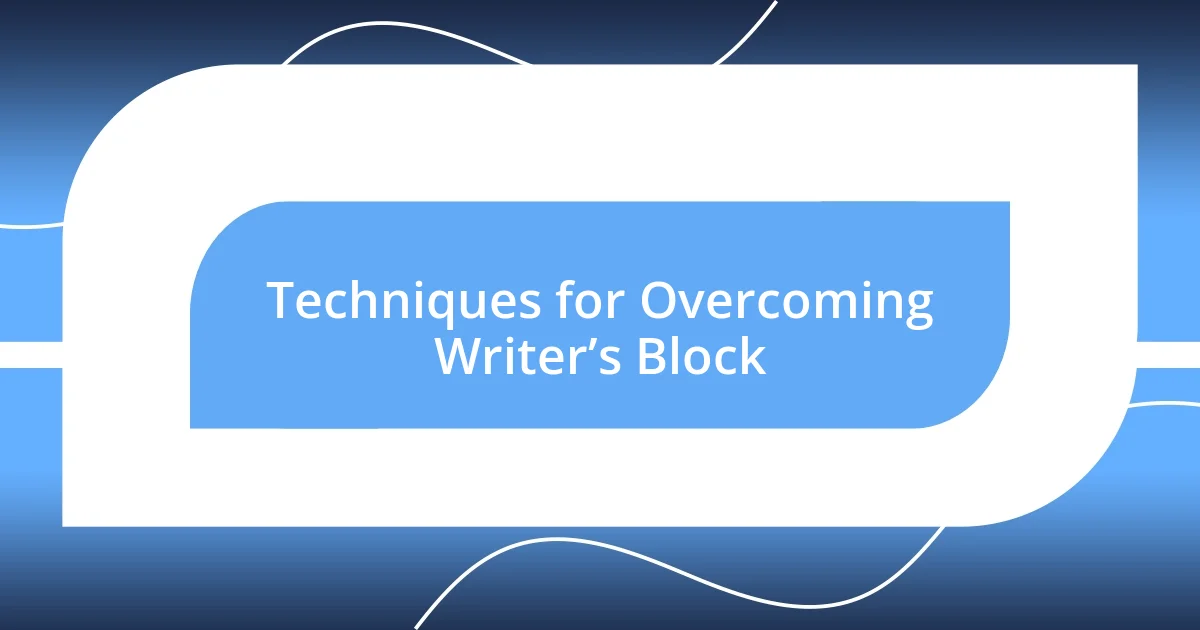Key takeaways:
- Writing prompts serve as powerful tools for sparking creativity and overcoming writer’s block, encouraging exploration of different writing styles and voices.
- Establishing a consistent writing schedule enhances focus, productivity, and skill development, transforming writing into a ritual rather than a chore.
- Gathering inspiration from daily life and engaging in a supportive community for feedback can significantly enrich the writing process and the revision journey.

Understanding Writing Prompts
Writing prompts are a powerful tool that can spark creativity and help overcome writer’s block. I remember the first time I encountered a prompt that asked me to describe a forgotten childhood memory. It was a simple sentence, yet it transported me back in time, allowing me to relive those moments vividly. Isn’t it amazing how a few carefully chosen words can unlock such deep emotions?
Understanding writing prompts means recognizing their role in inspiring unique ideas. These prompts can vary from specific scenarios to abstract concepts, giving writers the freedom to explore different genres and styles. When I receive a prompt that feels particularly challenging, it often leads me to discover facets of my writing voice that I didn’t know existed. Haven’t you found that stepping outside your comfort zone can yield the most rewarding results?
A well-crafted writing prompt can act as a compass, guiding you through the vast terrain of imagination. Reflecting on my own practice, I often find myself revisiting prompts that pushed me to write beyond my limits. They aren’t just directives; they’re invitations to engage in a dialogue with ourselves and our experiences. How often do you allow a simple phrase to shape your creative journey? It’s a process that transforms nothing into something remarkable.

Creating a Consistent Schedule
Creating a consistent writing schedule has been a game changer for me. By dedicating specific time blocks each day, I’ve noticed a significant improvement in my focus and productivity. Some days, just knowing that I have a writing session lined up helps me channel my thoughts more effectively.
It’s also fascinating how consistency can shape your writing habit. I used to write sporadically, and I often felt disconnected from my work. Once I established a routine, it felt like I was nurturing a relationship with my creativity. Have you ever experienced that feeling of anticipation when you know you’re about to immerse yourself in your writing?
As I look back, each session not only helped me sharpen my skills but also allowed me to explore different emotional landscapes. By committing to a schedule, I’ve turned writing into a ritual rather than a chore. I often wonder—how would my creative journey evolve if I hadn’t established those daily rituals? The answer lies in the depth of connection I’ve built with my craft.
| Aspect | Less Consistent Schedule | Consistent Schedule |
|---|---|---|
| Focus | Difficulty focusing | Increased concentration |
| Creativity | Infrequent bursts | Regular inspiration |
| Skill Development | Stagnation | Ongoing improvement |

Gathering Daily Inspiration
Gathering inspiration is about immersing yourself in the world around you. I often find that everyday experiences fuel my creativity. A walk in the park or a chat with a stranger can spark an idea that evolves into a full piece of writing. It’s fascinating how inspiration often strikes in the most unexpected places, isn’t it?
Here are some effective ways I gather daily inspiration:
– Nature Walks: The sights and sounds of nature never fail to ignite my creativity.
– Reading Widely: Whether it’s fiction, poetry, or articles, every piece adds to my toolbox of ideas.
– Journaling: I jot down thoughts, dreams, and snippets of conversation, which serve as great prompts later.
– Art and Music: Attending exhibits or listening to a favorite playlist can stir emotions that lead to new concepts.
– Conversations: Engaging with friends or strangers often unveils fresh perspectives and ideas.
Sometimes, the simplest moments provide the richest inspiration. I recall a day when I overheard a conversation about a childhood pet. From it came a series of written pieces—each exploring themes of love, loss, and nostalgia. Those little sparks of life can be the foundation for beautifully complex narratives. I’ve made it a point to stay open to the world, as it continually feeds my creativity in ways I never anticipate.

Techniques for Overcoming Writer’s Block
I’ve encountered my fair share of writer’s block, and it’s often left me staring blankly at the page. One of the most effective techniques I’ve found is changing my environment. Whether I move to a different room or head to a café, just the act of altering my surroundings seems to help shake off that mental fog. Have you ever noticed how a fresh view can spark new thoughts?
Another method that works wonders is setting a timer. I often challenge myself with short, focused writing sprints, usually around 10 or 15 minutes. It sounds simple, but this technique floods my mind with ideas as I race against the clock. I’ve turned it into a little game—can I write a full paragraph before the timer goes off? It’s amazing how that pressure can unlock creativity and push past the block.
Embracing imperfection can also break down the barriers of writer’s block. I remind myself that drafts don’t have to be perfect; they just need to exist. When I feel the urge to edit while writing, I pause and let those self-critical thoughts go. This mindset shift encourages a flow of words that often leads to surprising insights. Have you tried writing without the pressure of making it flawless? I’ve found that it often reveals new layers of my thoughts I wouldn’t have accessed otherwise.

Developing a Writing Space
Creating a dedicated writing space is one of the most rewarding decisions I’ve made as a writer. I’ve transformed a cozy corner of my home into a little sanctuary, filled with personal touches that inspire me. From colorful art on the walls to cherished books lining the shelves, this space reflects my personality and fuels my creativity. Have you ever noticed how your surroundings can impact your mood and productivity?
Lighting plays a crucial role in my writing space, too. A bright, airy atmosphere with plenty of natural light lifts my spirits while making my ideas flow more freely. On days when the sunlight streams in through the window, I feel an energy that drives me to write. In contrast, I’ve found that using warm table lamps during the evening creates a calming, focused environment. What kind of lighting works best for you?
Finally, I think it’s essential to have the right tools within reach. I like to keep my favorite notebooks, pens, and even a vision board nearby. This way, when inspiration strikes, I can capture my thoughts immediately without rummaging through clutter. I recall a time when I found an old notebook filled with half-finished ideas that reignited my passion for a series I thought I’d abandoned. Have you ever rediscovered something that kickstarted a creative endeavor? Providing yourself with a well-organized and inviting space makes the writing process not only easier but also much more enjoyable.

Reviewing and Revising Your Work
When it comes to reviewing and revising my work, I believe it’s crucial to step back and view my writing through a fresh lens. After I’ve penned my initial draft, I find it incredibly helpful to take a break—sometimes a few hours or even a day. This pause allows me to return with clearer eyes, ready to catch inconsistencies and awkward phrases I might have overlooked before. Have you tried giving yourself some distance from your work? I can’t tell you how many times I’ve noticed glaring errors just by allowing myself that small respite.
As I dive into my revisions, I often read my work aloud. This simple technique brings a whole new rhythm to the text and helps me hear how it flows. Sometimes, I’ll even act as if I’m presenting the piece to an audience, which adds an element of performance that can uncover areas needing improvement. When a sentence stumbles off my tongue, I know it’s time to rework it. Have you ever experienced the power of your own voice in shaping your prose?
Finally, incorporating feedback from trusted peers or writing groups can significantly enhance my revision process. Sharing my work with others allows me to gain insights I might not have considered. I remember a time when a fellow writer pointed out a plot hole I hadn’t noticed. It felt daunting at first, but that advice led me to refine my narrative in unexpected ways. Have you ever had your perspective shifted by someone else’s eyes? Engaging with others turns the solitary act of writing into a collaborative journey, enriching my work and sparking new ideas.

Tracking Progress and Setting Goals
Tracking my progress as a writer has become a game-changer for me. I like to maintain a journal where I jot down daily word counts and reflect on my writing sessions. It not only helps me visualize my growth but also serves as a motivating reminder of the commitment I’ve made. Have you ever felt that surge of accomplishment when you can see how far you’ve come?
Setting specific goals is another essential practice in my routine. For instance, I prioritize weekly objectives, such as completing a certain number of writing prompts or dedicating a set amount of hours to my craft. I remember a particularly busy week when I felt overwhelmed, but breaking my goals down into bite-sized tasks made the process less daunting and more enjoyable. How have your goals shaped your writing journey?
I also find it incredibly rewarding to celebrate small victories along the way. Whether it’s finishing a challenging prompt or simply maintaining consistency, taking a moment to acknowledge these achievements fills me with joy. I recall a time when I treated myself to a favorite snack after hitting a milestone. It reminded me that writing is not just about the end product but also about the everyday victories that keep us inspired. What small wins can you celebrate in your writing routine?














